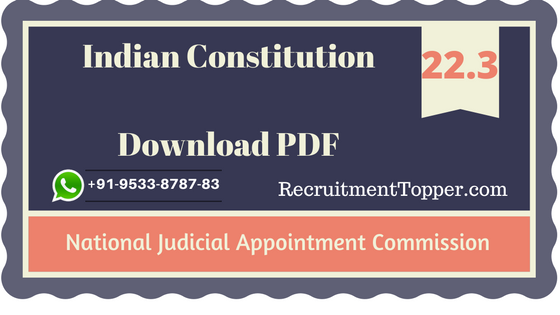National Judicial Appointment Commission | Indian Constitution
The 99th Constitutional (Amendment) Act, 2014 and the National Judicial Appointment Commission Act, 20144 have Appointment been enacted with a view to bring more transparency in the judicial appointments, (see Chapter 4).
In Art. 124, for the words “after consultation with such of the Judges of the Supreme Court and of the High Courts in the States as the President may deem necessary for the purpose”, the words, figures and letter “on the recommendation of the National Judicial Appointments Commission referred to in article 124A” has been substituted. Further, three new Articles viz. Articles 124A, 124B and 124C have been inserted in the Constitution which are as under:
“124A. (1) There shall be a Commission to be known as the National Judicial Appointments Commission consisting of the following, namely:—
(a) the Chief Justice of India, Chairperson, ex officio;
(b) two other senior Judges of the Supreme Court next to the Chief Justice of India—Members, ex officio;
(c) the Union Minister in charge of Law and Justice—Member, ex officio;
(d) two eminent persons to be nominated by the committee consisting of the Prime Minister, the Chief Justice of India and the Leader of Opposition in the House of the People or where there is no such Leader of Opposition, then, the Leader of single largest Opposition Party in the House of the People— Members:
Provided that one of the eminent person shall be nominated from amongst the persons belonging to the Scheduled Castes, the Scheduled Tribes, Other Backward Classes, Minorities or Women:
Provided further that an eminent person shall be nominated for a period of three years and shall not be eligible for renomination.
(2) No act or proceedings of the National Judicial Appointments Commission shall be questioned or be invalidated merely on the ground of the existence of any vacancy or defect in the constitution of the Commission.
124B. It shall be the duty of the National Judicial Appointments Commission to—
(a) recommend persons for appointment as Chief Justice of India, Judges of the Supreme Court, Chief Justices of High Courts and other Judges of High Courts;
(b) recommend transfer of .Chief Justices and other Judges of High Courts from one High Court to any other High Court; and
(c) ensure that the person recommended is of ability and integrity.
124C. Parliament may, by law, regulate the procedure for the appointment of Chief Justice of India and other Judges of the Supreme Court and Chief Justices and other Judges of High Courts and empower the Commission to lay down by regulations the procedure for the discharge of its functions, the manner of selection of persons for appointment and such other matters as may be considered necessary by it.”.
As per the amended provisions of the Constitution, the Commission will consist of a) Chief Justice of India (Chairperson, ex officio), b) Two other senior judges of the Supreme Court next to the Chief Justice of India – ex officio, c.) The Union Minister of Law and Justice, ex-officio, d) Two eminent persons (to be nominated by a committee consisting of the Chie’f Justice of India, Prime Minister of India and die Leader of opposition in die Lok Sabha or where there is no such Leader of Opposition, then, die Leader of single largest Opposition Party in Lok Sabha), provided that of the two eminent persons, one person would be from the Scheduled Castes or Scheduled Tribes or OBC or minority communities or a woman. The eminent persons shall be nominated for a period of three years and shall not be eligible for re-nomination.
As per the amended Constitution, the functions of the Commission is to
(i) recommend persons for appointment as Chief Justice of India, Judges of the Supreme Court, Chief Justices of High Courts and other Judges of High Courts, (ii) recommend transfer of Chief Justices and other Judges of High Courts from one High Court to any other High Court and (iii) ensure that the persons recommended are of ability, merit and other criteria mentioned in the regulations related to the Act.
However, it is noteworthy that several writ petitions have been filed in the Supreme Court challenging the 99th Constitutional Amendment, 2014 and the National Judicial Appointment Commission Act, 2014, on the ground that not only did it threaten the independence of the judiciary but also that the Parliament was not competent to pass it because the constitutional amendment giving it such power had not come into effect.40 In the meanwhile, the Central Government notified the 99th Constitutional Amendment, 2014 and the National Judicial Appointment Commission Act, 2014 whereby, it came into force with effect from 13.04.2015.
Under s. 4 of the National Judicial Appointment Commission Act, 2014 the Central Government shall, within a period of 1 thirty days from the date of coming into force of this Act, intimate the vacancies existing in the posts of Judges in the Supreme Court and in a High Court to the Commission for making its recommendations to fill up such vacancies. The Central Government shall, six months prior to the date of occurrence of any vacancy by reason of completion of the term of a judge of the Supreme Court or of a High Court, make a reference to the Commission for making its recommendation to fill up such vacancy. The Central Government shall, within a period of thirty days from the date of occurrence of any vacancy by reason of death or resignation of a judge of the Supreme Court or of a High Court, make a reference to the Commission for making its recommendations to fill up such vacancy.
More Resources

